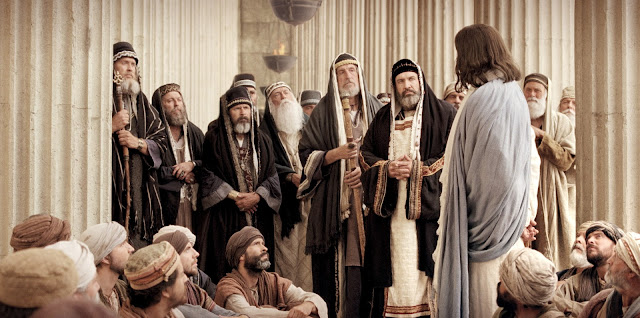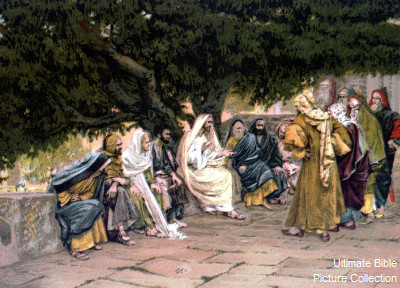Today, Jesus denounces the Pharisees and scribes as outrageous hypocrites, yet He tells His disciples to do whatever they say. Why?
Gospel (Read Mt 23:1-12)
In the many parables He taught, Jesus gave His enemies, the religious elites of Jerusalem, ample opportunities to recognize Him as their Messiah and be converted. Their response, instead, was to try to trap and silence Him. In today’s Gospel, He now gives a direct warning to His followers about the dangers they present to God’s people. However, He begins His warning with a surprising exhortation: “The scribes and the Pharisees have taken their seat on the chair of Moses. Therefore, do and observe all things whatsoever they tell you, but do not follow their example.” This presents a conundrum to the modern mind. Why would Jesus bind His followers to obeying people whom He denounces as fakes?
Jesus makes reference to “the chair of Moses.” In the synagogues, when teachers of the Law of Moses read the Scripture, they stood up. When they instructed the congregation about its meaning, they sat down, just as Jesus did in the synagogue in Nazareth when He began His public ministry (read Lk 4:16-20). Clearly, this “chair of Moses” was a seat of teaching authority in the Old Covenant. Moses was long dead, but the authority God gave him to lead His people and deliver His Word to them lived on in the “chair,” or office of leadership. The one who sat and taught in it was able to preach truthfully, otherwise Jesus would never have instructed His disciples to fully obey it. However, the authority provided by the chair of Moses did not translate into personal holiness for those who sat in it, as Jesus makes clear: “For they preach but they do not practice.” To live in accordance with what a man authoritatively taught from the chair of Moses was a personal, individual decision. We might say that while the charism of truth conferred by the chair of Moses made a man’s teaching infallible (free from error), it did not make him impeccable (free from sin).
Does this sound familiar? Of course, it does! This principle is the same one at work in the Chair of Peter, the papacy, where the teaching authority of the New Covenant resides. It is very important for us as Catholics to see that it was Jesus Himself who suggested that this charism of truthful, authoritative teaching can actually work, even when it is exercised by men who choose not to live the truth they teach. The promise Jesus made to Peter when He gave him the keys to the kingdom (see Mt 16:13-20) was that the gates of hell would never prevail against His Church. His Church was to be built on the foundation of Peter, on the office of leadership Peter would fill. Those who sit in the Chair of Peter teach with infallible authority. A Church that can teach error would not be one protected from hell! A Church that cannot teach truth authoritatively is doomed to constant fracture and disunity. However, the popes who sit in that Chair are not by any means thereby impeccable (free from sin). We know our history includes men who chose to live up to the truth they taught, as well as, sadly, those who didn’t.
Here, Jesus exposes the teachers of the Law in His day as hypocrites, men who perform all their religious works in order to be seen and honored by others. Even the way they dressed reflected their love of themselves. Phylacteries were small boxes containing Scripture passages that Jews wore on their arms and foreheads to keep the Word of God close to their actions and thoughts. The bigger the boxes were, the more obvious was the show of piety. Tassels, too, were regulated by Mosaic law (read Num. 15:38). Making them more visible was another ostentatious flash of apparent compliance with that Law.
These men loved their reputations. That is why Jesus warned His followers against desiring titles of respect and honor—rabbi, father, master. This was not, of course, an absolute prohibition against the use of these titles. Even the New Testament writers use “father” for natural fathers (read Heb 12:7-11) and for spiritual fathers in the Church (read 1 Cor 4:15; Philem 10). The spiritual fatherhood of priests in the Church today is an extension of this practice. Jesus’ warning was against pride, not titles: “The greatest among you must be your servant.” Those who seek to exalt themselves set themselves up for a fall. Those who consciously choose the way of humility and service, who give no thought to their own status or reputations, have nothing to worry about. Their futures are in God’s hands.
Possible response: Lord Jesus, help me choose obedience and humility and to forget about looking spiritual.
First Reading (Read Malachi 1:14b-2:2b, 8-10)
Malachi was a prophet in Judah at the time when Jews who had been exiles in Babylon were allowed to return and rebuild their nation (about 460 B.C.). They had rebuilt the Temple, restored the priesthood, and attempted to regain what they had lost through infidelity to the covenant. However, disillusionment had set in. Prosperity had not returned to their land, enemies surrounded them, and they suffered from drought, bad crops, and famine. Many began to doubt God’s love. It looked to them as though the evil and self-reliant were the ones who prospered.
Malachi announced that their difficulties came from a poison within—unfaithfulness again to the covenant. There was the problem of corrupt worship being offered by the priests. They were irreverent and perfunctory in their Temple duties. The example they set for the people was leading them astray. In particular, they were very lax about the kind of offerings people brought to the Temple for sacrifice. This indifference to the precepts of the Law bred indifference in the people, too. They became stingy and deceitful. A failure in the covenant inevitably meant failure in the life of the community. Breaking faith with God will always mean breaking faith with one another.
Malachi warns the priests that the blessings they enjoyed in their Temple service (an elevated status among the people) would be turned to curses if they didn’t turn from their unfaithfulness. This history helps us understand the grave warning Jesus gave His followers about the example set by corrupt religious elites. The temptation to abuse religious authority is present in every age, including our own. God’s covenant with His people will always stand. Each one of us, priest and layman, must decide whether he will heed God’s call to listen, to lay His commandments to heart, and to give glory to His Name, just as Malachi urged in his day. The question he asks is one that stirs up a decision about allegiance through all the ages: “Has not the one God created us? Why, then, do you break faith with one another, violating the covenant of our fathers?”
Possible response: Heavenly Father, please give grace to Your priests to serve well the Covenant Jesus made in His blood.
Psalm (Read Ps 131:1-3)
The psalmist gives us a prayer that can be a path away from the temptation to religious vanity and pride—the very danger about which Jesus warns His followers (and Malachi preached against in his day). What can we do when we find we want to busy ourselves with “great things” in order to impress others or ourselves or God? We can pray with the psalmist: “O, LORD, my heart is not proud, nor are my eyes haughty…I have stilled and quieted my soul like a weaned child.” The great weapon against the “busyness” of impressing others with our showy religiosity is stillness before the LORD. When we are at rest, “like a weaned child on its mother’s lap,” we are not depending on our many good works to gain a reputation for us with others or with God. How helpful this can be to us, in our over-stimulated lives! With the psalmist we can say, “In You, LORD, I have found my peace.”
Possible response: The psalm is, itself, a response to our other readings. Read it again prayerfully to make it your own.
Second Reading (Read 1 Thess 2:7b-9, 13)
Our readings have instructed us about bad examples among those given religious authority. Now, St. Paul gives us the example of how a true servant of the Lord lives. See how he describes the gentle, tender love he and his missionary companions showed to the people to whom they were sent to preach the Gospel. These men were not merely performing a religious duty. They shared “not only the Gospel of God, but [their] very selves as well.” St. Paul and the others worked by their own hands (he was a tentmaker) so that their support would not be a financial burden on the new converts. Consequently, the people who heard him preach understood that his message was “not a human word…but…the Word of God.” Human beings preached a Divine Word (just as those in the chair of Moses did in the Old Covenant and those in the Chair of Peter do in the New Covenant). Because St. Paul chose to live up to the truth he preached, the Word of God was not discredited and was “at work in you who believe.”
Good shepherds lead their sheep to rich pasture.
Possible response: Lord Jesus, thank You for the many good priests I have known in Your Church, men who share not only the Gospel but their very selves as well.
 Readings:
Readings:


